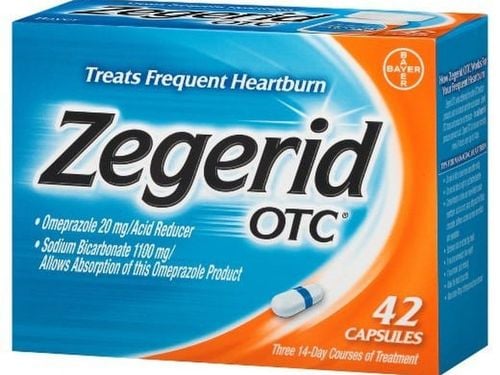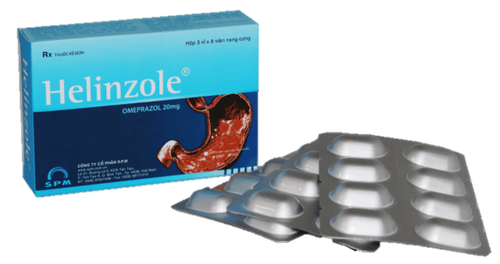This is an automatically translated article.
Antaloc drug works to treat a number of diseases of the gastrointestinal tract, the most common of which is gastroesophageal reflux. To ensure safety and maximize the effectiveness of treatment, patients need to take the drug exactly as prescribed by the doctor.
1. Uses of the drug Antaloc
Antaloc drug with the main active ingredient is Pantoprazole, used to treat a number of diseases of the gastrointestinal tract. Pantoprazole is a proton pump inhibitor, inhibiting the last stage of gastric acid production by covalently binding to the H+/K+-ATPase enzyme system. Therefore, the drug acts on both normal gastric acid secretion and stimulant-induced mechanisms. Binding to the H+/K+-ATPase system results in a prolonged anti-acid effect of the drug for more than 24 hours for all doses tested.
Indications of Antaloc 40 mg:
Gastroesophageal reflux disease (GERD). Gastrointestinal ulcers. Prevention of gastric ulcers caused by side effects of non-steroidal anti-inflammatory drugs. Zollinger-Ellison syndrome (pathological hypersecretory condition).
2. How to take Antaloc?
2.1. Dosage of Antaloc Antaloc 40 mg is used for adults and children 12 years of age and older. Dosage will also be different for each patient. Use according to the dose prescribed by your doctor or as directed on the label. Take the medicine just before a meal, preferably in the morning. Note that the tablet should be swallowed whole, not broken, crushed or chewed.
Treatment of gastroesophageal reflux: The usual dose is 1 tablet/day. When patients do not respond to treatment can be increased to 2 tablets / day. Treatment for 8 weeks. If after 8 weeks, if the condition has not improved, patients usually need another 8 weeks to achieve the effect of treatment. In combination with antibiotics to kill H.pylori bacteria: H.pylori-positive gastric ulcer and duodenal ulcer patients should be considered for drug use based on the appropriateness of the antibiotic and the resistance of the bacteria. bacteria. Based on resistance patterns, the following regimens may be recommended for H.pylori eradication: 1 Antaloc tablet twice daily in combination with: 1000 mg Amoxicillin twice daily. ; 500 mg Clarithromycin/time x 2 times/day. 1 Antaloc tablet / time x 2 times / day in combination with: 400 - 500 mg of Metronidazol / time x 2 times / day (or 500 mg of Tinidazol / time x 2 times / day); 250 - 500 mg Clarithromycin/time x 2 times/day. 1 Antaloc tablet / time x 2 times / day in combination with: 1000 mg Amoxicillin / time x 2 times / day; 400 - 500 mg Metronidazol / time x 2 times / day (or 500 mg Tinidazol / time x 2 times / day). The 2nd Antaloc tablet should be taken 1 hour before the evening meal. The usual duration of combination drug therapy is 7 days and a maximum of 2 weeks. To ensure ulcer healing, an extended duration of pantoprazole may be indicated, however, the recommended oral dose for gastric and duodenal ulcers should be considered. Treatment of stomach ulcers: The usual dose is 1 tablet/day. When patients do not respond to treatment can be increased to 2 tablets / day. Treatment for 4 weeks. If after 4 weeks, if the condition has not improved, patients usually need another 4 weeks to achieve the effect of treatment. Treatment of duodenal ulcer: The usual dose is 1 tablet/day. When patients do not respond to treatment can be increased to 2 tablets / day. Treatment for 2 weeks. If after 2 weeks, if the condition has not improved, patients usually need another 2 weeks to achieve the treatment effect. Zollinger-Ellison syndrome and other pathological hypersecretory conditions: Treatment should be initiated at a dose of 80 mg/day, then the dose may be increased or decreased based on a gastric acid secretion test. With doses above 80 mg/day, it should be divided into 2 oral doses/day. If necessary, the dose may be increased temporarily to more than 160 mg/day. However, the duration of treatment should not be longer than is necessary to control acid secretion. The duration of treatment for this syndrome and other pathological hypersecretory conditions is not limited and should be tailored to clinical need. 2.2. Special populations: Patients with hepatic impairment: The daily dose should not exceed 20 mg of pantoprazole in patients with severe hepatic impairment. Do not use in the eradication of H.pylori in patients with moderate to severe liver dysfunction because there are no studies to determine the safety and effectiveness of the drug in combination therapy in these patients. Patients with renal impairment: No dose adjustment is necessary. Do not use in the eradication of H.pylori in patients with impaired renal function because there are no studies to determine the safety and effectiveness of the drug in combination therapy in these patients. Elderly: No dose adjustment is necessary for elderly patients. Children: Antaloc is not recommended for use in children under 12 years of age because of limited safety and efficacy data in this population. If you miss a dose of Antaloc, take it as soon as possible from the time you notice it. However, if it is almost time for your next dose, skip the missed dose and take the new scheduled dose. Never double the dose to make up for a previously forgotten dose, as this may cause an overdose.
3. Antaloc drug side effects
Medicines can cause some unwanted effects. Get medical attention as soon as possible if any of the following side effects occur:
Common :
Fatigue, headache. Skin rash, hives. Muscle pain, joint pain. Uncommon :
Asthenia , dizziness , dizziness . Itchy. Increase liver enzymes. Rare :
Excessive sweating, edema. Nodules, acne, alopecia, exfoliative dermatitis, angioedema, erythema multiforme. Stomatitis, digestive disorders. Blurred vision, photophobia. Insomnia, drowsiness, agitation or inhibition, ringing in the ears, tremors, confusion, hallucinations. Blood tests showed eosinophilia, agranulocytosis, leukopenia, and thrombocytopenia. Impotence. Hematuria, interstitial nephritis. Hepatitis, encephalopathy in people with liver failure, increased triglycerides. Decreased blood sodium.
4. Warnings and cautions when using Antaloc.
Patients with hepatic impairment: Patients with severe hepatic impairment should be monitored regularly for liver enzymes during treatment with Antaloc, especially during prolonged use. If there is an increase in liver enzymes, the drug should be discontinued. Gastric malignancy : Antaloc may prevent detection of symptoms of gastric malignancy, causing delay in diagnosis. In the presence of any symptoms such as marked unintentional weight loss, recurrent vomiting, dysphagia, hematemesis, anemia, melena, or gastric ulcer, a diagnosis of exclusion must be made. malignant gastric disease. Further examination is needed if symptoms persist despite appropriate treatment. Use in combination with HIV protease inhibitors: For HIV protease inhibitors whose absorption is dependent on gastric pH, such as Atazanavir, it is not recommended to be used in combination with Antaloc because it can significantly reduce the bioavailability. availability of these drugs. Effects on the absorption of vitamin B12: In patients with Zollinger-Ellison syndrome and other pathological hypersecretory conditions requiring long-term therapy, Antaloc, as well as all other acid-suppressing agents, may impair the absorption of vitamin B12. Decreased absorption of vitamin B12 due to decreased or deficient gastric acid. For patients with reduced vitamin B12 stores or at risk of reduced vitamin B12 absorption, the use of the drug should be reminded. Gastrointestinal infections : The use of Antaloc may slightly increase the risk of gastrointestinal infections caused by bacteria such as Salmonella and Campylobacter or C.difficile. Hypomagnesaemia: It has been reported that in patients treated with proton pump inhibitors (PPIs) such as pantoprazole for a duration of at least 3 months and in most cases for 1 year, development of hypomagnesaemia has been reported. severe hypomagnesemia. Some signs of severe hypomagnesaemia, such as fatigue, spasticity, delirium, convulsions, dizziness, and ventricular arrhythmias, may occur, but these symptoms often begin insidiously and are often overlooked. In most cases, this condition can be improved with magnesium supplementation and discontinuation of PPIs. In cases where long-term therapy is expected or PPIs are administered concomitantly with Digoxin or other medicinal products that may cause hypomagnesemia, such as diuretics, consideration should be given to measuring magnesium levels before and periodically during treatment. by PPIs. Fractures: The use of Antaloc, especially in high doses and for a long time (more than 1 year), may increase the risk of hip, wrist and spine fractures moderately, mainly in the elderly. age or in patients with other risk factors. Many observational studies suggest that PPIs may increase the overall risk of fracture by 10 to 40%. Patients at risk for osteoporosis should receive adequate vitamin D and calcium supplements and should also receive care according to current clinical guidelines. Subacute lupus erythematosus (SCLE): Antaloc or other PPIs have been associated with very rare cases of subacute lupus erythematosus. If symptoms appear, especially on sun-exposed areas of the skin, accompanied by symptoms of joint pain, the patient should contact medical attention immediately for care and should consider the use of medication. Patients with a history of subacute lupus erythematosus following use of one PPI may be at increased risk of subacute lupus erythematosus with other PPIs. Effects on laboratory tests: Antaloc may increase the concentration of Chromogranin A (CgA), affecting the detection of neuroendocrine tumors. To avoid this effect, the drug should be discontinued at least 5 days before CgA measurement. If CgA and gastrin levels do not return to the reference range prior to initiation of treatment, measurement should be repeated 14 days after discontinuation of PPIs. Antaloc is commonly used to treat diseases of the gastrointestinal tract. Medicines should be taken exactly as prescribed by the doctor. When experiencing any abnormal signs during the course of taking the drug, it is necessary to contact emergency medical attention for timely support.
Please dial HOTLINE for more information or register for an appointment HERE. Download MyVinmec app to make appointments faster and to manage your bookings easily.













